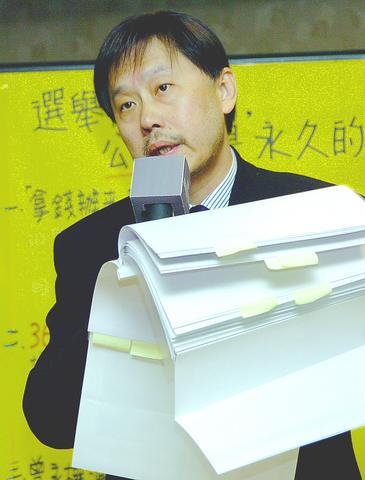Former Taiwan Pineapple Group (
The 48-year-old businessman has been keeping a low profile for the past two years, struggling with serious monetary problems and the lawsuit surrounding the Chung Shing Bank loan scandal.
On Jan. 20 the Taipei District Court sentenced Huang to nine years in prison and a fine of NT$300 million on a breach of trust conviction related to the Chung Shing Bank scandal. The bank's former president Wang Yu-yun (

PHOTO: SUNG CHIH-HSIUNG, TAIPEI TIMES
The scandal surfaced in late April 2000 after an investigation into allegations that the bank had extended credit to the Taiwan Pineapple Group, much of it without collateral. It was also discovered that nearly NT$120 million out of the loans to Huang's company had been transferred to the accounts of another company owned by Wang Yu-yun, who is also considered to be a political heavyweight in southern Taiwan.
On March 11, Huang said at a press conference that KMT Chairman Lien Chan (
According to Huang, the NT$10.91 million was for the taxes on a purchase of two pieces of land in Taichung County. Lien bought the land, approximately 700 ping in total, on Jan. 20, 1998.
Lien asked then-legislator Wu Tse-yuan (伍澤元) to help with the payment, according to Huang.
He said that Lien promised he would pay him back, but this never happened.
"He is so broke today because he is a man who keeps his promises to friends," said Richard Chang, who identified himself as a close friend of Huang's but would not give his Chinese name.
Chang organized Thursday's press conference on behalf of Huang.
According to him, Huang currently has debts of approximately NT$2 billion.
Chang said Huang incurred these debts because he spent all his money to try to maintain the Taiwan Pineapple Group's stock price when it started to decline in 1998.
"He did not run away because of the debts. On the contrary, he is trying very hard to pay off the debts," Chang said.
Huang has spent his entire professional career at the Taiwan Pineapple Group, which was purchased by his father, Huang Cheng-chin (
The Taiwan Pineapple Group is best known for its canned food, and was one of Taiwan's top-10 companies in 1961.
Huang Tsung-hung graduated with a business degree from Japan's famous Waseda University in 1984. In the same year, at the age of 27, he became the group's general manager.
Since joining the company, Huang Tsung-hung strived to expand its business from canned foods to a variety of different fields, including hotels, construction, land development, international trading, the arts, education, banking and even car dealerships. The company's stock prices kept rising along with its expanding field of business.
With business expanding quickly, Huang Tsung-hung turned his attention to stock investments and real estate deals. But when the international economy started slowing in 1997, Huang started losing money on his investments and monetary problems started to surface.
In the meantime, his close relations with politicians, celebrities and other businessmen also brought him lots of problems, since most of these connections concerned money. As law enforcement officials started investigations into these relations, the crisis deepened for Huang Tsung-hung amid ever-widening accusations.

Alain Robert, known as the "French Spider-Man," praised Alex Honnold as exceptionally well-prepared after the US climber completed a free solo ascent of Taipei 101 yesterday. Robert said Honnold's ascent of the 508m-tall skyscraper in just more than one-and-a-half hours without using safety ropes or equipment was a remarkable achievement. "This is my life," he said in an interview conducted in French, adding that he liked the feeling of being "on the edge of danger." The 63-year-old Frenchman climbed Taipei 101 using ropes in December 2004, taking about four hours to reach the top. On a one-to-10 scale of difficulty, Robert said Taipei 101

Nipah virus infection is to be officially listed as a category 5 notifiable infectious disease in Taiwan in March, while clinical treatment guidelines are being formulated, the Centers for Disease Control (CDC) said yesterday. With Nipah infections being reported in other countries and considering its relatively high fatality rate, the centers on Jan. 16 announced that it would be listed as a notifiable infectious disease to bolster the nation’s systematic early warning system and increase public awareness, the CDC said. Bangladesh reported four fatal cases last year in separate districts, with three linked to raw date palm sap consumption, CDC Epidemic Intelligence

US climber Alex Honnold left Taiwan this morning a day after completing a free-solo ascent of Taipei 101, a feat that drew cheers from onlookers and gained widespread international attention. Honnold yesterday scaled the 101-story skyscraper without a rope or safety harness. The climb — the highest urban free-solo ascent ever attempted — took just more than 90 minutes and was streamed live on Netflix. It was covered by major international news outlets including CNN, the New York Times, the Guardian and the Wall Street Journal. As Honnold prepared to leave Taiwan today, he attracted a crowd when he and his wife, Sanni,

Two Taiwanese prosecutors were questioned by Chinese security personnel at their hotel during a trip to China’s Henan Province this month, the Mainland Affairs Council (MAC) said yesterday. The officers had personal information on the prosecutors, including “when they were assigned to their posts, their work locations and job titles,” MAC Deputy Minister and spokesman Liang Wen-chieh (梁文傑) said. On top of asking about their agencies and positions, the officers also questioned the prosecutors about the Cross-Strait Joint Crime-Fighting and Judicial Mutual Assistance Agreement, a pact that serves as the framework for Taiwan-China cooperation on combating crime and providing judicial assistance, Liang